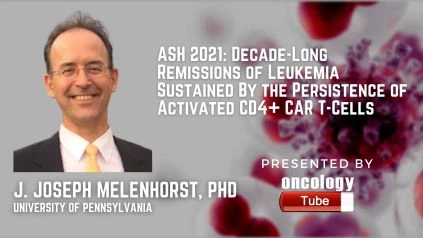J. Joseph Melenhorst, Ph.D., Research Professor of Pathology and Laboratory Medicine Department: Pathology and Laboratory Medicine from the University of Pennsylvania speaks about the ASH 2021 Abstract 166 Decade-Long Remissions of Leukemia Sustained By the Persistence of Activated CD4+ CAR T-Cells.
Link to Abstract:
https://ash.confex.com/ash/2021/webprogram/Paper152664.html
Adoptive transfer of chimeric antigen receptor (CAR)-reprogrammed T cells has shown promise in treating a variety of cancers. In chronic lymphocytic leukemia (CLL), functional persistence of CAR T-cells is a crucial predictor of long-term remissions, although the properties of long-term persistent CAR-engineered T cells have not been fully investigated. The fate of CD19-specific (CAR19) T-cells in two leukemia patients who obtained and maintained a full remission over a decade ago was investigated in this study. Molecular destiny mapping was performed on long-term persisting CAR T cells utilizing lentiviral vector integration site sequencing at numerous time intervals in patients 1 and 2, respectively, up to 9.0 and 7.2 years post-infusion. In the first 1.6 years of patient 1, this study demonstrated minimal, if any, CAR T-cell clonal stability. The first patient
‘s CAR T cell repertoire stabilized at year two, with a strong clonal focusing that lasted until the last follow-up. From the first month until about 12 months later, as well as from year 1 to 5, the second patient had moments of repertory stability. In both patients, a few clones dominated the CAR T cell repertoire, which was observed across a multi-year period. CAR T-cells were still identifiable 10+ years after infusion using flow and mass cytometry. Deep immunophenotyping with a 40-marker mass cytometry panel revealed divergence in effector CAR T cell characteristics but convergence in memory CAR T cell characteristics, with a prominent highly activated effector-memory CD4+ population expressing immune regulatory molecules developing late after infusion. A fraction of CD4+ CAR T-cells that expressed high levels of Ki67, indicating a proliferative nature, stood out. Ki67[hi] CD4+ CAR T-cells gradually emerged as the dominant population in both patients: this population accounted for 15.9% of CAR T-cells in patient 1 at month 1.8, rising to 97.0 percent by year 9.3; and 0.2 percent of CAR T-cells in patient 2 at month 2.4, rising to 87.2 percent by year 7.2. At matching time periods, we compared Ki67 expression in CD4+ CAR T-cells to CAR-negative T cells from these patients and discovered that this level of Ki67 expression was substantially CAR T-cell specific. In comparison to the CD4+ CAR T-cell fraction, CD8+ CAR T-cells showed a proliferative trend, but Ki67 expression was generally lower and less robust. The activation markers CD38, HLA-DR, and CD95, as well as transcription factors EOMES and TOX, checkpoint indicators CTLA-4, LAG-3, and TIGIT, and memory markers CD27 and CCR7, were all expressed in these Ki67[hi] CD4+ T cells. These findings point to two distinct phases of CAR T-cell therapy responses in these patients: an initial response phase dominated by cytotoxic CD8+ T cells and Helios[hi] CAR T-cells, and a long-term remission period dominated by a uniquely proliferative CD4+ CAR T-cell phenotype.
We used CITE-Seq with single-cell T cell receptor-beta VDJ profiling on CAR T-cells acquired 9.3 years after infusion to characterize these long-lasting CAR T-cells at a single-cell resolution. Despite evidence of chronic antigen-mediated signaling, these long-lasting CAR T-cells showed substantial evidence of continuous activation, proliferation, and aerobic glycolysis. Our findings shed light on the formation of a long-term memory anti-tumor response, which is required for long-term remission in leukemia after CAR T-cell therapy.

